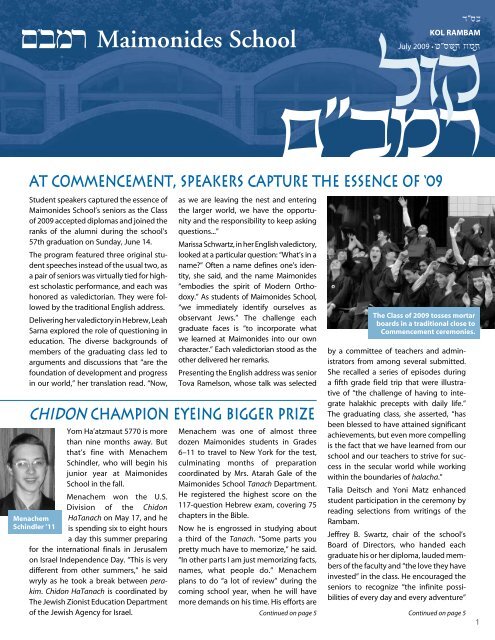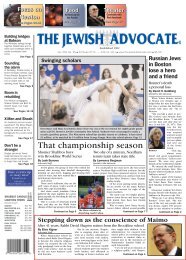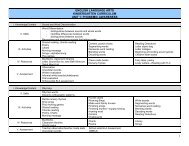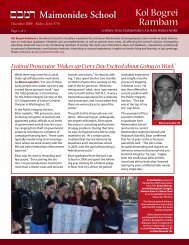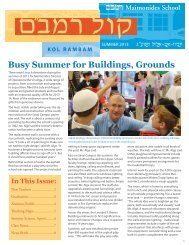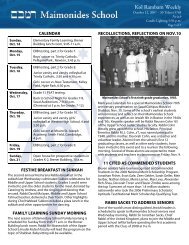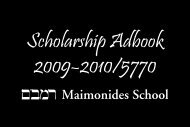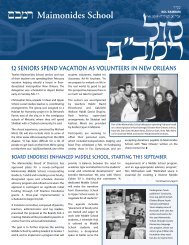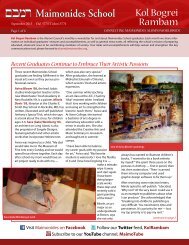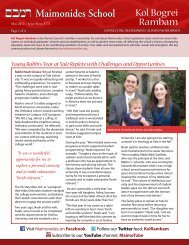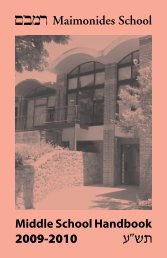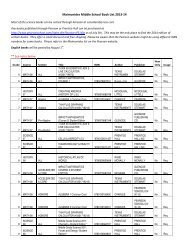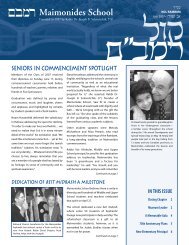Summer 2009 - Tammuz 5769 - Maimonides School
Summer 2009 - Tammuz 5769 - Maimonides School
Summer 2009 - Tammuz 5769 - Maimonides School
- No tags were found...
You also want an ePaper? Increase the reach of your titles
YUMPU automatically turns print PDFs into web optimized ePapers that Google loves.
KOL RAMBAMJuly <strong>2009</strong> • hŠqyz fenzAT COMMENCEMENT, SPEAKERS CAPTURE THE ESSENCE OF ‘09Student speakers captured the essence of<strong>Maimonides</strong> <strong>School</strong>’s seniors as the Classof <strong>2009</strong> accepted diplomas and joined theranks of the alumni during the school’s57th graduation on Sunday, June 14.The program featured three original studentspeeches instead of the usual two, asa pair of seniors was virtually tied for highestscholastic performance, and each washonored as valedictorian. They were followedby the traditional English address.Delivering her valedictory in Hebrew, LeahSarna explored the role of questioning ineducation. The diverse backgrounds ofmembers of the graduating class led toarguments and discussions that “are thefoundation of development and progressin our world,” her translation read. “Now,CHIDON CHAMPION EYEING BIGGER PRIZEYom Ha’atzmaut 5770 is morethan nine months away. Butthat’s fine with MenachemSchindler, who will begin hisjunior year at <strong>Maimonides</strong><strong>School</strong> in the fall.Menachem was one of almost threedozen <strong>Maimonides</strong> students in Grades6–11 to travel to New York for the test,culminating months of preparationcoordinated by Mrs. Atarah Gale of the<strong>Maimonides</strong> <strong>School</strong> Tanach Department.He registered the highest score on the117-question Hebrew exam, covering 75chapters in the Bible.Menachem won the U.S.Division of the ChidonHaTanach on May 17, and heis spending six to eight hoursa day this summer preparingfor the international finals in Jerusalemon Israel Independence Day. “This is verydifferent from other summers,” he saidwryly as he took a break between perakim.Chidon HaTanach is coordinated byThe Jewish Zionist Education DepartmentNow he is engrossed in studying abouta third of the Tanach. “Some parts youpretty much have to memorize,” he said.“In other parts I am just memorizing facts,names, what people do.” Menachemplans to do “a lot of review” during thecoming school year, when he will havemore demands on his time. His efforts areof the Jewish Agency for Israel. Continued on page 5MenachemSchindler ’11as we are leaving the nest and enteringthe larger world, we have the opportunityand the responsibility to keep askingquestions...”Marissa Schwartz, in her English valedictory,looked at a particular question: “What’s in aname?” Often a name defines one’s identity,she said, and the name <strong>Maimonides</strong>“embodies the spirit of Modern Orthodoxy.”As students of <strong>Maimonides</strong> <strong>School</strong>,“we immediately identify ourselves asobservant Jews.” The challenge eachgraduate faces is “to incorporate whatwe learned at <strong>Maimonides</strong> into our owncharacter.” Each valedictorian stood as theother delivered her remarks.Presenting the English address was seniorTova Ramelson, whose talk was selectedThe Class of <strong>2009</strong> tosses mortarboards in a traditional close toCommencement ceremonies.by a committee of teachers and administratorsfrom among several submitted.She recalled a series of episodes duringa fifth grade field trip that were illustrativeof “the challenge of having to integratehalakhic precepts with daily life.”The graduating class, she asserted, “hasbeen blessed to have attained significantachievements, but even more compellingis the fact that we have learned from ourschool and our teachers to strive for successin the secular world while workingwithin the boundaries of halacha.”Talia Deitsch and Yoni Matz enhancedstudent participation in the ceremony byreading selections from writings of theRambam.Jeffrey B. Swartz, chair of the school’sBoard of Directors, who handed eachgraduate his or her diploma, lauded membersof the faculty and “the love they haveinvested” in the class. He encouraged theseniors to recognize “the infinite possibilitiesof every day and every adventure”Continued on page 5
ARABIC LYRICS AND RAV HUNA’S HETERBy Rabbi David Shapiro, Rosh YeshivaRambam (who lived in the 12th-centuryMuslim cultural orbit) was asked whetherit is permissible to listen to music whoselyrics are in Arabic. His answer is preservedamongst his teshuvot (Responsa):“There is no halachic distinction betweenthe Hebrew language and the Arabiclanguage. Something is either permittedor prohibited by virtue of its substance(content), not the language that is itsmedium … God intends for us to be ‘asanctified nation’ (‘goi kadosh’ [Shemot19:6]); therefore every action and everyspoken word should lead toward thatgoal.”This is quite a daunting mandate; itassumes a high degree of self-awarenessand purpose. Our harried lives oftendeny us the regular moments of introspectionthat Rambam presupposes. Forthose who live by the September-Juneacademic calendar, the two months ofJuly and August offer a precious opportunityfor self-assessment. Are we, in fact,leading our daily lives by the standard ofShemot 19:6? This brings us directly tothe second half of the title of this essay.now treats that violation-of-halachah asif it were permitted.” In other words,once a sin of omission or commissionbecomes routine, one loses inhibitionsregarding it, and no longer feels pangsof conscience over its violation.This is certainly true on a personal level.There is yet, however, a further dimensionto this challenge. The verse citedabove from Shemot 19:6 is part of God’scharge to us before our experience onMount Sinai. Subsequent to it, God commandedus (Devarim 4:9-10): “You shalltransmit to your children the impactof the experience you had (Ramban)and the content of the revelation youreceived (Rashi) at Mount Sinai.” So weare charged not only with the responsibilityto live our own lives by thesedemanding standards, but also to fosterin our children the same values andcommitment.Each of us thus needs to ask at regularintervals: am I leading my life with halachicconsistency? Am I modeling for mychildren a religious life that will engagethem, that will inspire them, that willcommand their respect?Based upon my daily conversations withour high school students, I’d like to suggesta few areas in which Modern OrthodoxJews need to ask the above questions.I have chosen one behavioral goal in eachof the following aspects of our lives: intellectual,emotional, and physical.The Talmud cites 7 times (Yoma 86b, 87a;Mo’ed Katan 27b; Sotah 22a; Kiddushin20a, 40a; Arachin 30b) a profound psychologicalinsight of Rav Huna. “‘Whena person sins, and then repeats the sin,that sin is now permitted.’ Can Rav Hunahave truly meant to say that the forbiddenDVARdeed is now permissible?! Rather,TORAHhemeant to communicate that the sinnerIntellectual: Do I learn Torah daily? Do Iset aside 10–15 minutes each and everyMyriam Lebowitz introduces someof her kindergarteners following apoetry session for parents. Childrenare, from left, Judah Gewurz,Nadav Weglein, Eliana Nahoumi,Noam Shapiro, Eitan Garner, JonahWeinstock, Gabrielle Green, EmmettWechsler, Noga Starobinski, LainaParis and Noa Domankevitz.day to learn a few pesukim from theTorah, or a Mishnah, or a paragraph ofthe Shulchan Aruch? Am I fulfilling thehalachic requirement to engage in talmudTorah daily, and am I modeling formy children a passion for that religiousvalue?Emotional: Do I daven Shacharit,Minchah and Ma’ariv daily? Again, amI discharging my personal obligation?Furthermore, am I conveying to my childrenthe centrality of tefillah in the dailylife of a Jew?Physical: Do I restrict my food intaketo kosher food? Has “Rav Huna’s heter”allowed me to fall into the trap of rationalizingmy visits to Legal Sea Foods,Chuck E. Cheese, Domino’s Pizza andsushi restaurants? Have I convincedmyself that these are different from eatingpork? How seriously will my childrenrelate to halachah if I trivialize the standardsof kashrut in my own life?Let each family spend time during Julyand August discussing these questionsat home. We, in school, shall then challengeour students upon their returnin September to do the same. By<strong>Maimonides</strong> <strong>School</strong> working togetherwith our students and their families, weshall elevate the level of halachic compliancein our community, and therebypresent to our children a lifestyle theywill find attractive and meaningful.Rabbi Shapiro holds the Rabbi YitzhakTwersky Chair in Talmud and JewishThought at <strong>Maimonides</strong> <strong>School</strong>.
DEJA VU—ANOTHER DANNY BELLIN ’05 GRADUATION SPEECHDanny Bellin delivered the Hebrew valedictory as the top academicstudent of the <strong>Maimonides</strong> Class of 2005. “I thought thatwas pretty cool,” he recalled, adding, “I thought it would be coolto give the university speech, too.”Fast forward a little less than four years, and Danny is on the daisat Boston University’s Nickerson Field, delivering the studentcommencement address. He commended the class of <strong>2009</strong> forits commitments to service, multiculturalism, and social changethat he said earned it the nickname “Generation We.” And healso pointed to challenges that lie ahead.Danny didn’t win this honor by virtue of his high school experience.First he had to be an academic achiever. The universityadministration invited the top 300 or so seniors to submit draftsto a faculty committee. Danny’s entry made the final five, eachof whom delivered his or her address in an auditorium setting.When he was notified of the honor, “I was incredibly surprised. Isaw it as an opportunity to represent my family, my friends andthe Jewish community.”There were some 4,000 undergraduates in the BU Class of<strong>2009</strong>, and about 16,000 guests—faculty members, relativesand friends—packing the university stadium on May 17. “I wasnervous—I didn’t want to mess up in front of all those people,”Danny acknowledged. “But I was excited about the possibilitythat this could really go off well.”By all accounts it did. “It seems like people enjoyed it,” Dannysaid. “It was hard for me to gauge just how many people wereclapping, but afterwards it was really amazing to be recognizedand congratulated by so many strangers. It was almost like beingkind of a rock star. It felt a little weird—in a good way.”The five-minute speech ended up three minutes longer as Dannyslowed his delivery. He pointed out traits that make the currentgeneration distinct—“our optimism, our independence … Wevolunteer more, we are more politically engaged, more open tomore progressive social ideas…” He also noted that “we’re socomfortable using all the new technology that is really connectingeverybody across the world.” Boston University “imbued uswith these qualities” and prepared the class to meet contemporarychallenges, he continued.His face was projected on the giant screens, on which all couldsee that he was wearing a kippah rather than the traditional mortarboard.That, Danny said, reflected “the idea that Jews shouldtake opportunities they have for Kiddush Hashem. It really camefrom the foundation I got at <strong>Maimonides</strong>.”A Trustees Scholar at BU, Danny graduated summa cum laudewith a degree in biomedical engineering. He plans to pursuea doctorate in electrical engineering at Columbia Universitynext year. He has accepted fellowships from the Department ofDefense, the National Science Foundation and Columbia.As an undergraduate, Danny conducted research in the orthopedic,developmental biomechanics and neuromuscular researchlabs, where he studied motor-unit firings that produce musclecontractions. He hopes to continue in a research project that hasan impact on health and medicine.Danny Bellin ’05 speaking at Boston University’sNickerson Field, as displayed on jumbotron screens.See and hear Danny’s address on YouTube.com. Go to channel“MaimoTube” or use the following consecutive links:http://www.youtube.com/watch?v=PQOAYDX8a6Uhttp://www.youtube.com/watch?v=S4vOqptgdS8&feature=relatedMazal tov to…Eleanor (Stern) Weiner ’58 on the engagement of her grandson Tzvi Barkai inYerushalayim.Minna (Brazil) ‘71 and Avi Ringelheim on the birth of their granddaughter, AriellaAliza Rochel Ringelheim.Shani Abelson ’86 and Jerry Schneider on the birth of their son, Hillel Yehuda.Elie ’91 and Jessica Gertel on the bat mitzvah of their daughter Dahlia. Grandparentsare Reva (Levovitz) ’68 and Harvey Gertel.Nechama (Reichert) ‘93 and David Vazana on the birth of their son, Yisrael Moshe.His grandfather is Rabbi Asher Reichert ’67.Shara (Zuckerman) ’91 and Igal Shetrit on the birth of their son, Elisha.Sara (Pollak) ’92 and Benjamin Taragin on the bat mitzvah of their daughter, Elisheva.Ayla and Mechael Osband ’95 on the birth of their son, Afik.Shoshana Eisenberg and Andrew Geller ’96 on their marriage.Estye and Eli Fenton ’96 on the birth of their daughter, Laila Golda.Amy Margulies and Gabe Kahn ’96 on their engagement.Molly and Nahum Palefski ’96 on the birth of their son, Charles Dov.Dr. Ilana (Hefter) Feuerstein ’97 on receiving her doctor of medicine degree fromBoston University.Sharon and Michael Ravid ’97 on the birth of their son, Ethan Jack.Elizabeth Solomont ’97 on her marriage to Philip Levy.Emely and Dr. Daniel Aghion ’99 on the birth of their daughter, Gabriella.Rebecca Israel ’00 and David Sendor ’01 on their marriage.Nessa and Noah Liben ’00 on the birth of their daughter, Ayelet Batya. Noah recentlygraduated from Fordham Law <strong>School</strong>.Ilya Pittel ‘01 on his marriage to Avital Silman.Menachem Wecker ‘01 on his engagement to Jaclyn Schiff.Eva (Fenton) ’02 and Hillel Broder on the birth of their son, Moshe Natan.Ellie Dubitzky ’04 and Jeff Berlin on their marriage.Condolences to…Dr. Elona (Meiselman) Lazaroff ‘56 and Orit Kent ‘89 on the loss of their belovedmother and grandmother, Mrs. Shulamith Meiselman, z”l, sister of Rabbi Dr. Joseph B.Soloveitchik, zt”l.ALUMNIEve (Bulman) Jacobs ’71 on the loss of her beloved husband, Rabbi Jay Jacobs, z”l.Dr. Jeremy Kahan ’83 on the loss of his beloved wife, Amy Kahan, z”l.
MOCK TRIAL TEAM WINS ADMIRATION, RESPECT IN ATLANTAThe nine students of the <strong>Maimonides</strong><strong>School</strong> delegation to the National High<strong>School</strong> Mock Trial Championship inAtlanta returned to the Bay State withnot only a 20th place ranking, but alsoadmiration and respect for their uncompromisingstand on religious principle.The contest took place May 7–10, withtrials scheduled for Friday and Saturday.Back in April, when the school’s requestfor alternate trial times was denied, thestudents were prepared to forfeit ratherthan violate observance of Shabbat.However, an 11th-hour policy reversalopened the door to a full competitiveexperience for the team—not to mentiona memorable Shabbat in the Atlantacommunity.After winning the Massachusetts championshipMarch 27 in a classic courtroombattle in historic Faneuil Hall againstSharon High <strong>School</strong>, the <strong>Maimonides</strong>team embarked on a six-week ride thatculminated with television appearances,compliments from judges and coaches,and freewheeling discussions with fellowstudents late into the night. Oh yes,there were also two scrimmages andfour trials packed into 33 hours.The 27-member state roster was pareddown to nine for the nationals: CaptainsHarry Chiel, Michael Kosowsky andLeah Sarna, fellow seniors Avi Fuld,Pnina Grossman, Natan Kawesch andHana Snow, and juniors Steven Fineand Benjamin Niewood. The delegationalso included David Fredette, the SuffolkCounty assistant district attorney whoserves as attorney-coach, and RabbiRoy Rosenbaum of the limudei kodeshfaculty.While the students developed strategiesand practiced courtroom techniques inresponse to new case materials, adultsupporters confronted the NationalHigh <strong>School</strong> Mock Trial Board’s policyprohibiting changes to the tournamentschedule to accommodate religiousobligations. The advocates includednoted Washington Atty. Nathan Lewinand his daughter Alyza, who is a former<strong>Maimonides</strong> student; several parentsof team members; alumni; the Anti-Defamation League; and other interestedparties, including former NationalMock Trial Board members.Still, as the group departed for Atlanta,it was expecting to take part only in twoFriday trials, then celebrate Shabbat inthe community as the tournament continuedon Saturday.The team had scheduled three scrimmagetrials for Thursday, May 7, tryingto get as much as it could from what itunderstood would be a truncated tournament.Then, around 9:15 Wednesdayevening, the students learned that thenational organization had consentedto scheduling four official trials—oneThursday afternoon and three on Friday.It turned out that Judge Doris L. Downs,chief judge of Fulton County SuperiorCourt, had declared that the refusal toaccommodate the <strong>Maimonides</strong> teamwas wrong. She told the national organizationthat she would close countycourthouses, where Friday trials werescheduled, if the schedule was notadjusted for <strong>Maimonides</strong>.From 10 a.m. Thursday to after 6 p.m. onFriday, the <strong>Maimonides</strong> team packed intwo practice trials and four actual ones(not to mention a photo session andnegotiations with courthouse security toclear Shabbat clothing on hangers).How was the <strong>Maimonides</strong> delegationreceived after days of escalating publicity?“From the second we arrived, everyoneknew who we were because of ourkippas, and people would just walk rightup to us and tell us they hoped everythingworked out,” Ben recounted. “Theother teams were super nice and friendly.Before we were accommodated, they allwished us luck when we passed themThe state champion Mock Trial team visits withGov. Deval Patrick in his State House office.and they saw the boys’ kippas,” saidPnina. “The other teams were extremelyencouraging,” Avi added. “Multiple timesthroughout the week, team membersand coaches approached us and told ushow proud they were of us, and we didthe right thing by fighting it.”The students took a van to their hosts’neighborhood; on the way, “we celebratedPesach Sheini with some matzahthat Pnina brought,” Leah noted. “Ourhosts were great. The whole communitywas extremely supportive,” Michaelreported. “They all welcomed us withopen arms and lots of food, and we hadan amazing Shabbat experience there.”“They really showed us the true meaningof Southern hospitality,” said Natan.Pnina added, “The Atlanta communitywas adorable. They were totally sheppingnachas from us.” Friday night dinnerwas at the home of former <strong>Maimonides</strong><strong>School</strong> parents Jeff and Barbara Weener,and the seniors had a nice reunion withtheir former classmate Kobi Weener.Rabbi Adam Starr of Young Israel ofToco Hills hosted a lunch that includedstudents from Yeshiva Atlanta. “We gotto know some really nice kids, and hearall about their lives and school,” Leahsaid. After mincha at Young Israel, thestudents conducted a panel about MockTrial. “The community was so gracious,asking polite questions and commendingus on our menschlichkeit,” Leah said.“Everyone on the team got to answerat least one question.” Ben added, “Therabbi just kept telling us over and overhow much of a Kiddush Hashem it was,and it made us all feel great to know thatthe support of the entire Jewish communitywas behind us.”Continued on page 7
Graduation scenes, clockwise from top: senioressayist Tova Ramelson; graduates applaudtheir parents; Marissa Schwartz delivers theEnglish valedictory; Yoni Matz and Talia Deitschpresent excerpts from the writings of theRambam. (Photos by John Cooper)<strong>2009</strong> Chidon Ha-TanachContinued from p. 1almost entirely in Hebrew (“sometimesI have to look up a word or two”). He isnot partial to particular editions of theTanach, though he prefers larger type.Menachem, 16, describes himself as ahumble person, and doesn’t feel he hasbeen changed significantly by his newlyacquiredcelebrity. In school, he said, mostof the attention comes from “the Chidonpeople—the others who took the Chidonclass.” He hopes to relax this summerwith some computer games, and alsofind some time to study for the SATs.“We are all so proud of Menachem,”said Rabbi Yair Altshuler, principal. “Hisnational championship is a reflectionnot only on an outstanding student butalso on our school and its commitmentto Limud Torah, Jewish values, and toZionism. For, indeed, the study of Tanachis the study of our basic culture in ourown land.”“Menachem worked very, very hard forthis,” said Mrs. Gale, coordinator andmotivator of student participation inthe Chidon for the past six years. “Healways had a lot of knowledge. But whenhe came back from Pesach break andtold me he had finished memorizingYirmiyahu, I realized that this is how awinner speaks. This is real potential.”Mrs. Gale is providing encouragementand study materials during the summer,Menachem said. He credits his teacheras the “motivating force” behind hissuccess, and also thanks Rabbi YaakovJaffe of the Upper <strong>School</strong> Judaic studiesfaculty for his assistance. Rabbi Jaffeand his wife Yael, also a <strong>Maimonides</strong>teacher, were national winners in 1996and 1997, respectively (before they kneweach other).Chidon success has prompted Menachemto reassess his post-high school direction.“I’ve started thinking more of a religiouscareer track as opposed to before,”he acknowledged.Commencement <strong>2009</strong>Continued from p. 1experienced by living “a Torah-centeredlife in a very modern world.”The <strong>Maimonides</strong> Upper <strong>School</strong> principalsalso offered praise and counsel to thegraduates.“You guide your way to the future bylooking at the past,” explained Rabbi YairAltshuler, principal. “Never forget to begrateful to your parents and grandparents…Above all, always remember thatyou are part of a long chain that links usforward to the past. Parents, we pass thatchain to your children.”“You set a tone in the school this year ofmaturity, cooperation and substance,”said Ken Weinstein, principal for generalstudies, as he closed the program. “Eachone of you has so much to offer, it’s overwhelming…You made the entire schoola happier place for all of us.”The other <strong>2009</strong> graduates are MeiraAltabet, Avital Bailen, Deborah Bellin,Leslie Black, Joey Blechner, RebeccaBoroda, Asher Cheses, Harry Chiel, TaliaDeutsch, Jesse Ebner, Adam Edelman,Ellie Epstein, Eliana Frim, Avi Fuld,Zehava Gale, Avi Geller, Zevvy Goldish,Pnina Grossman, Dahlia Gruen, JosephHasson, Reava Ishkahov, Rachel Jaret,Jessica Kasmer-Jacobs, Aliza Katz, NatanKawesch, Jona Koplow and MichaelKosowsky.Also, Malka Langermann, Sara MiriamLiben, Benjamin Marks, JonathanMilgram, Benjamin Miller, ArielaModigliani Caviglia, Avi Packer, PinchusPolack, Gabriel Rozman, Hanna Rubin,Aaron Schacht, Joseph Schacht, NicoleSchlesinger, Yosef Segal, Michael Shrager,Oren Shuchatowitz, Erica Singer, LaurenSinger, Hana Snow, Aliza Stein, JesseTurk, Shoshana Weiner, Michelle Wiener,Ariella Wolfson, Josh Yarmush, AsherZimble and Eliza Zisblatt.
SIYUM CULMINATES LANDMARK Gr. 5 YEAR<strong>Maimonides</strong> <strong>School</strong>’s elementary gradeshave completed their first academic yearas a discrete educational unit, all housedin one building.“I thought the year was great,” said theprincipal, Rabbi David Saltzman. “All theteachers finally knew each other, andthat gave us that sense of community. Itallowed not only for collegiality but alsocommunication among the faculty.”All sections of Kindergarten throughGrade 5 were accommodated in theBrener Building, as sixth grade joinedseventh and eighth in a new Middle<strong>School</strong> configuration on Saval Campus.That arrangement “empowered the fifthgraders to be the leaders of the school,”Rabbi Saltzman noted. “We saw the fifthgraders really take that mantle. Theyrose to the occasion and were role modelsfor the rest of the school.”The year culminated for the 45 studentsJune 17 with the school’s first Fifth GradeSiyum. The theme of the celebration wasleadership, which has been the emphasisall year long, according to RabbiSaltzman.“Throughout the year,” he related, “fifthgraders show their leadership skillsthrough the Chesed L’Chaverim programwith younger students, running programswith them, mentoring them throughoutthe day, being their friend when they seethem in the hallway.”“That culminated with the leadership presentation,”he continued. “There was adivision of labor for what each child hadto do. That all came together. Everythingthat they learned throughout the year,and actually experienced themselves,was something they presented.”Highlighting the siyum were presentationsby nine student teams on famousleaders in Jewish and American history,ranging from Moshe, Esther and Hillel toMartha Washington, Alexander Hamiltonand Deborah Sampson (a RevolutionaryWar soldier for whom a street is named inSharon). The students not only undertookthe research and prepared oral and visualpresentations, but also gleaned leadershipqualities from each subject.Rabbi David Reisman, Grade 5 Judaic studiesteacher, praised the students in hisEnthralled as they watch the classvideo during the Grade 5 siyum are,from left, Adin Feder, Ethan Turk,Moshe Saltzman and Yaakov Brody.opening dvar Torah. ”All year I have beenimpressed with your desire to know,”he said. “True greatness may start in theclassroom but it does not end there,” hesaid, noting that the group’s conduct at arecent field trip to the State House “demonstratedwhat it means to be a religiousJew” and a <strong>Maimonides</strong> student.Fifth grade diplomas were presentedby Rabbi Saltzman, who shared thepodium with Rabbi Reisman and generalstudies teachers Elaine Geracht andAvi Pittleman. The siyum also included avideo tribute to the grade and a musicalrendition by the students. The fifth gradersalso produced their own yearbook,with guidance from their teachers.ADMINISTRATOR AIMS TO ENHANCE “CULTURE OF LEARNING”Barry Ehrlich, <strong>Maimonides</strong> <strong>School</strong>’s firstdirector of curriculum and instruction, sayshis two primary areas of emphasis beginningthis September will be curriculumdevelopment and review, and professionaldevelopment.“I think both fall into the category of creatinga vibrant learning community thatreflects the mission of the school, whereteachers and students learn in excitingand engaging sorts of ways, and, ideally,parents are part of that learning communityas well,” he said in an interview.Mr. Ehrlich joins the administration as partof the school’s participation in PeerlessExcellence, a five-year grant throughCombined Jewish Philanthropies tostrengthen area day schools. Consistentwith the school’s strategic plan, “emphasiswill be placed on curriculum review andimprovement and on professional developmentand mentoring for teachers,” saidRabbi Yair Altshuler, principal.Mr. Ehrlich is already meeting professionalcolleagues and laying some groundworkfor his new position from his home in metropolitanNew York, and expects to be onthe scene at <strong>Maimonides</strong> in August. It willbe a nostalgic experience, as Mr. Ehrlichgrew up on Gardner Road, around thecorner from the Brookline campus, andsaid he spent countless hours fishing andrelaxing alongside the Route 9 reservoir.The new director said he looks forwardto “further developing <strong>Maimonides</strong>’ cultureof learning,” integrating the work ofteachers across disciplines—from Judaicand general studies, from Kindergartenthrough Grade 12—“to foster learningas a more holistic enterprise… I havebeen in a lot of situations as an administratorand as a teacher in which I havebeen part of this kind of culture-buildingmission,” Mr. Ehrlich said.He was a founding administrator anddirector of general studies at SAR High<strong>School</strong> in the Bronx, and was foundingprincipal of a school for children withAsperger’s Syndrome that was part of theChild Study Center at New York University.He also worked as a gifted and talentedinstruction coordinator and history teacherat school districts in the Merrimack Valleyof Massachusetts and New Hampshire. Mr.Ehrlich earned his undergraduate degreeat Trinity College in Hartford, a master’sdegree in educational psychology fromthe University of Virginia, and his J.D. fromBoston College Law <strong>School</strong>.At <strong>Maimonides</strong>, he hopes “to build aninfrastructure so collegiality will be naturallypart of a teacher’s life,” always gearedtoward the ultimate objective “to help kidsbecome more successful learners.”“I am excited that he will be joining us andlook forward to collaborating with himas we focus on the important work thatlies ahead in curriculum and professionaldevelopment,” Rabbi Altshuler said.
SHABBATON SECURES YACHAD CHAPTER’S FUTUREBy Avi Fuld ‘09The Yachad Shabbaton hosted by the <strong>Maimonides</strong>Kehillah on May 1 and 2 was a huge success.Attended by many Yachad members and<strong>Maimonides</strong> Upper <strong>School</strong> students, it was oneof the biggest Yachad events of the year.Yachad (translated, “together”) is the OrthodoxUnion’s National Jewish Council for Disabilities,providing social, educational and recreationalprograms that bring together high school studentsand adults with special needs.As the school year wound down, I began toworry how the end of this year would affectthe future of the Boston chapter of Yachad.After all, many of the current participants andleaders were graduating seniors. Would therebe enough high school participants involvedin Yachad next year? This Shabbaton sweptaway any doubt I might have had. The minuteI walked in Friday night for Kabbalat Shabbat,Maariv, and dinner, I saw students from alldifferent grades. I was blown away by the presenceof so many <strong>Maimonides</strong> teenagers, manyat their first event.Throughout Friday night’s program of dinner,interactive games, and fun icebreakers, thisdiverse and energetic group of <strong>Maimonides</strong>students truly stepped up. I saw time and again<strong>Maimonides</strong> boys and girls treating the Yachadmembers with respect and kindness.The entire <strong>Maimonides</strong> Minyan communityopened their homes to Yachad. They helpedplan much of the weekend, and provided facilitiesand meals. In fact, the <strong>Maimonides</strong> Minyanjoined Yachad for Shabbat lunch, making it oneof the highlights of the Shabbaton. Families,high school students, and Yachad members atetogether, gave Divrei Torah, sang, and simplyenjoyed each others’ company.My personal highlight from the YachadShabbaton was on Saturday night, when<strong>Maimonides</strong> students and Yachad membersmet in the Fox Gymnasium. It may seem ordinary,but those games of freeze dance weplayed with the Yachad members just mademy day (and night) precisely for that reason. Itfelt “ordinary” and natural.Since that Shabbaton, I have witnessedincreased participation from the underclassmenat <strong>Maimonides</strong>. In fact, the final event ofthe year, a trip to the Boston Aquarium, wasplanned by two rising seniors who had neverbefore participated in Yachad. Knowing thisand experiencing the Spring Yachad Shabbatonleave me confident that Boston Yachad willflourish in the years to come.“Parnas Hayom” supports Days of learningSeveral <strong>Maimonides</strong> <strong>School</strong> grandparentshave honored their grandchildren while supportingthe school through a new opportunitycalled Parnas Hayom.The program dedicates an entire day of learningat the school in honor of one or more children.The special recognition is acknowledgedin messages to parents and teachers, schoolpublications and on the video screen at theentrance to the Brener Building.Recognized in May and June were JerryPomeranz ’10 by his grandparents, Bernardand Ruth Adler; first-grader Aviav Bernsteinby his grandmother, Arlene Bernstein; kindergartenerEitan Garner by his grandparents,Judy and Donald Garner and Marcia and MarcSlotnick; Ariana ’17, Danya ’19 and JudahGewurz ’21 by their grandmother, Carol LeeLoebenberg; and kindergartener BinyaminHills-Jaffe and first grader Natan Hills-Jaffe bytheir grandparents, Liz and Alan Jaffe.Several others are already lined up for the<strong>2009</strong>-2010 school year. For details on participatingin Parnas Hayom, contact MikeRosenberg in the Development Office (mike@maimonides.org, 617-232-4452, ext. 105).Rabbi Dr. Joseph B. Soloveitchik,lŠvfFounderRabbi M.J. Cohn, lŠfPrincipal EmeritusRabbi David ShapiroRosh YeshivaJeffrey B. SwartzChair, Board of DirectorsAbraham Levovitz, lŠfPresident EmeritusNathan Katz ’73Executive DirectorMike RosenbergEditorErica SchultzDesignerTamara KesselmanDirector of AdmissionsMiddle & Upper <strong>School</strong>Rabbi Yair AltshulerPrincipalKen WeinsteinPrincipal, General StudiesRabbi Avi BossewitchMiddle <strong>School</strong> CoordinatorElementary <strong>School</strong>Rabbi David SaltzmanPrincipalReena SlovinAssistant PrincipalKol Rambam is published by theOffice of Alumni and CommunityRelations at <strong>Maimonides</strong> <strong>School</strong>.Mock Trial Goes To AtlantaContinued from p. 4“Our community will be talking about andremembering this visit for a long time tocome,” said Jeff Weener. “The students represented<strong>Maimonides</strong> in a way that all here wantto model. The menschlichkeit the team exhibited,in their interactions and when questionedas a panel, showcased their upbringingand schooling. The school couldn’t have askedfor better ambassadors of its mission than thisgroup.”Comments, questions,and suggestions shouldbe addressed to:<strong>Maimonides</strong> <strong>School</strong>34 Philbrick RoadBrookline, MA 02445(617) 232-4452 x105info@maimonides.org
34 Philbrick RoadBrookline, MA 02445R E T U R N S E R V I C E R E Q U E S T E DNon-Profit Org.U.S. PostagePaidBrookline, MAPermit No. 59990Judge J. John Fox Gymnasium was packedwith hundreds of enthusiasts May 13 for the<strong>Maimonides</strong> Middle <strong>School</strong> performance ofFiddler on the Roof. Students and teachersenjoyed a reprise of the production thenext afternoon. The show was directed byMelody Michaelson ’07, a student at BrandeisUniversity, assisted by Middle <strong>School</strong> teachersJack Fidler and Estie Reidler.News & NotesRabbi David Ehrenkranz, Upper <strong>School</strong> limudei kodesh teacher and Grade10 dean, received a Keter Torah Award—the Rabbi and Mrs. M.J. CohnAward for Jewish Education—at the annual meeting of the Bureau ofJewish Education May 14. Keter Torah honorees are recognized for “outstandingcontributions and achievements in Jewish education.” RabbiEhrenkranz, who is also <strong>Maimonides</strong>’ softball coach and a teacher in theHebrew College Prozdor, joined the faculty in 1996. Previous Keter Torahwinners from <strong>Maimonides</strong> include Rabbi Jon Bloomberg, Mrs. DevorahCohn, Rabbi Cohn, z”l, Rabbi Seth Farber, Mrs. Ahuva Halberstam, Mrs.Brenda Hefter, Mrs. Sheva Wieder and Rabbi Isaiah Wohlgemuth, z”l.Mrs. Galit Konstantine’s Grade 4 Ivritclass celebrated Earth Day on April 22with a double-edged recycling project.They collected caps from discarded sodabottles and glued them in attractive floralpatterns to recycling containers in theBrener Building. “My fourth grade andI took Earth Day seriously,” the teachersaid. “We spoke about the importance ofkeeping the environment clean.”Students in Grades 4-12 were the first ever to hear the powerful story of UriCarmel, as the guest speaker shared it with them to keynote Yom HaZikaronobservances. Mr. Carmel, one of the government of Israel’s top legal officials, isstudying in the Boston area as a Wexner Fellow. Mr. Carmel told the studentsthat his father, an Air Force navigator, died in 1964 at age 21—weeks before hisbirth. “I never met my father, but the stories of his life and mine are one,” said Mr.Carmel, who served as a naval officer. The theme of the observance was “Fathersand Sons,” and also featured student readers; a vocal quartet of Meron Amar,Harry Chiel, David Rubinstein and Yaakov Schiff; a video tribute to a fallen hero;and memorial candle-lighting ceremonies recognizing relatives of students, staffand alumni who made the supreme sacrifice.Members of the <strong>Maimonides</strong> <strong>School</strong> Class of <strong>2009</strong>and their parents participated in a Gift of Life bonemarrow registry screening on Thursday evening,June 11, as part of Senior Class Night activities. TheMichael E. Osband Gift of Life Program is consideredthe culmination of the school’s efforts to instillthe importance of chesed, social responsibility, andgiving back to the community. The program has beenendowed by the Osband Family in memory of MichaelOsband, z”l, father of four <strong>Maimonides</strong> graduates anda dynamic volunteer leader who was renowned in thefield of pediatric hematology-oncology.Reproductions of powerful art worksby Holocaust survivor Samuel Bakmade Yom HaShoah <strong>5769</strong> meaningfuland memorable for <strong>Maimonides</strong> Upper<strong>School</strong> students. The art work, loanedby Pucker Gallery, depicted a varietyof symbolic images, all based on theiconic Warsaw Ghetto child with hisarms raised in surrender. The printswere displayed in the student lounge,and small groups quietly absorbedthe series, called “Icon of Loss,”throughout the day. The program wasarranged by Mickey Blechner Nyer,director of student activities.


